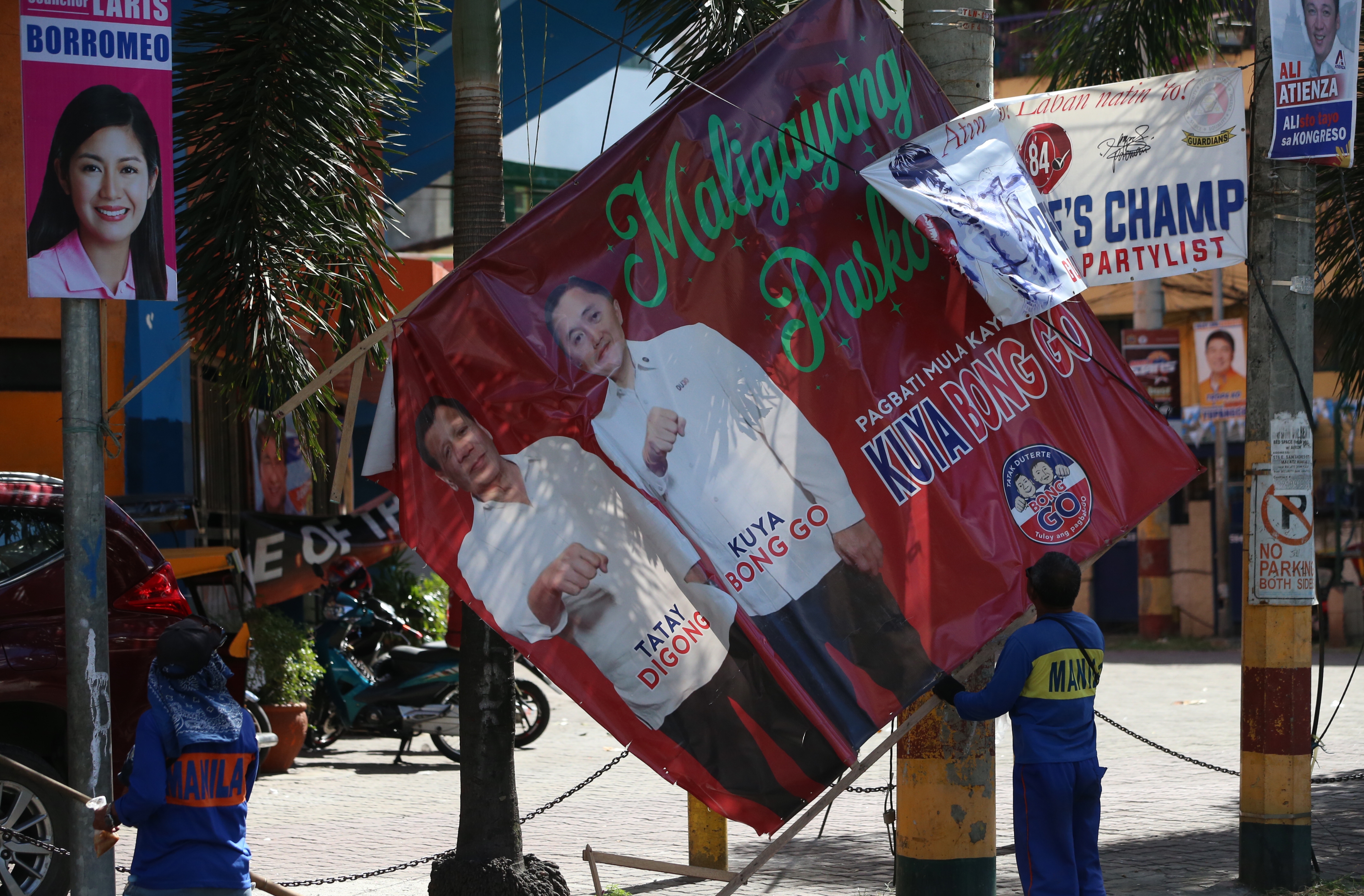
FUNDING RIDDLE The cost of propaganda materials of President Duterte’s former special assistant, Bong Go, accounted for the biggest chunk of the estimated P2.4 billion spent by 19 senatorial candidates before the start of the campaign period, according to the Philippine Center for Investigative Journalism. —EDWIN BACASMAS
Close to 20 senatorial candidates in May’s midterm elections have already spent a combined P2.4 billion to prop up their respective campaigns, yet the Commission on Elections (Comelec) is powerless to determine where these aspirants obtained their funds in hopes of landing a government position that only pays around P260,000 monthly.
Comelec spokesperson James Jimenez said the poll body, and by extension the public, had no means to find out how the candidates were able to afford their propaganda materials, which in some instances were well beyond their declared net worth, before the start of the campaign period.
“That’s precisely the problem with the sole election monitoring [mechanism] starting at the campaign period because every expense prior to that is really not transparent to the administrator, to us,” Jimenez said.
“We don’t know where that money is coming from. We have no legal foothold when it comes to that,” he added.
Top spenders
A study made by the Philippine Center for Investigative Journalism (PCIJ) found that 19 senatorial aspirants—both from the administration and the opposition—spent a whopping total of P2.4 billion in TV, radio, print and outdoor ads last year.
PCIJ said it determined the figure using the “rate card of media agencies monitored by Nielsen Media.”
Half of the total cost of precampaign expenses were accounted for by only three aspirants, namely, administration candidates Christopher “Bong” Go and Ilocos Norte Gov. Imee Marcos, and opposition stalwart Mar Roxas.
Go topped the list with an ad spending of P422.5 million, despite having a net worth of only P12.9 million.
Marcos, the eldest daughter of dictator Ferdinand Marcos, came in second, having spent P413.1 million.
Roxas, who already spent close to half a billion in his failed 2016 presidential run, placed third with a precampaign expense of P401 million.
Other candidates whom PCIJ said had spent anywhere from P12 million to P157 million in their precampaign propaganda were Sonny Angara, Bam Aquino, Grace Poe, Francis Tolentino, Cynthia Villar, Gary Alejano, Juan Ponce Enrile, Bong Revilla, Pia Cayetano, Nancy Binay, JV Ejercito, Koko Pimentel, Jinggoy Estrada, Zajid Mangudadatu and Jiggy Manicad.
Former presidential spokesperson Harry Roque already spent P174 million in precampaign ads before he decided to quit the Senate race early this month supposedly due to health reasons.
Supposed limit
Under Republic Act No. 9006, or the Fair Election Act, candidates are only allowed to spend P3 per voter. Since there are 61.8 million registered voters for the May polls, candidates are supposed to spend a maximum of P185.4 million for their campaign.
Should a senatorial aspirant win one of the 12 seats up for grabs, he will receive for his entire six-year term a total salary of around P18.7 million, or just a tenth of what he is expected to spend during the campaign period.
For the entire 90-day campaign period, candidates are expected to report three times to the Comelec’s finance office updates on their expenses.
Though all candidates are required to submit a month after the elections their statement of contribution and expenditures, there is no law that mandates them to disclose their fund sources for their precampaign propaganda.
Jimenez said the only way to remedy the information and transparency gap was to have a law that would close the loop, which would essentially affect the legislators themselves and the way they campaign in the future.
“It’s [the legislators’] job. It’s a challenge for them to ensure transparency prior to the start of monitoring for election expenses,” he said.
Recovering ‘investments’
Earlier, election watchdog Legal Network for Truthful Elections (Lente) warned the public against voting for candidates who splurged in their campaign, saying these individuals would try to get back their “investments” once elected into office.
“If you spend so much in a campaign, once in office you look at ways on how you could recover your expenses. That’s how graft and corruption starts in [the] government,” said Lente executive director Ona Caritos.
Kontra Daya convenor Danilo Arao said that in the absence of a law mandating the reporting of precampaign expenses, the Comelec should conduct an investigation to determine where the candidates sourced their funds.
Arao said this would assure the public that indeed no government funds were used to favor a particular candidate. —WITH A REPORT FROM JULIE M. AURELIO